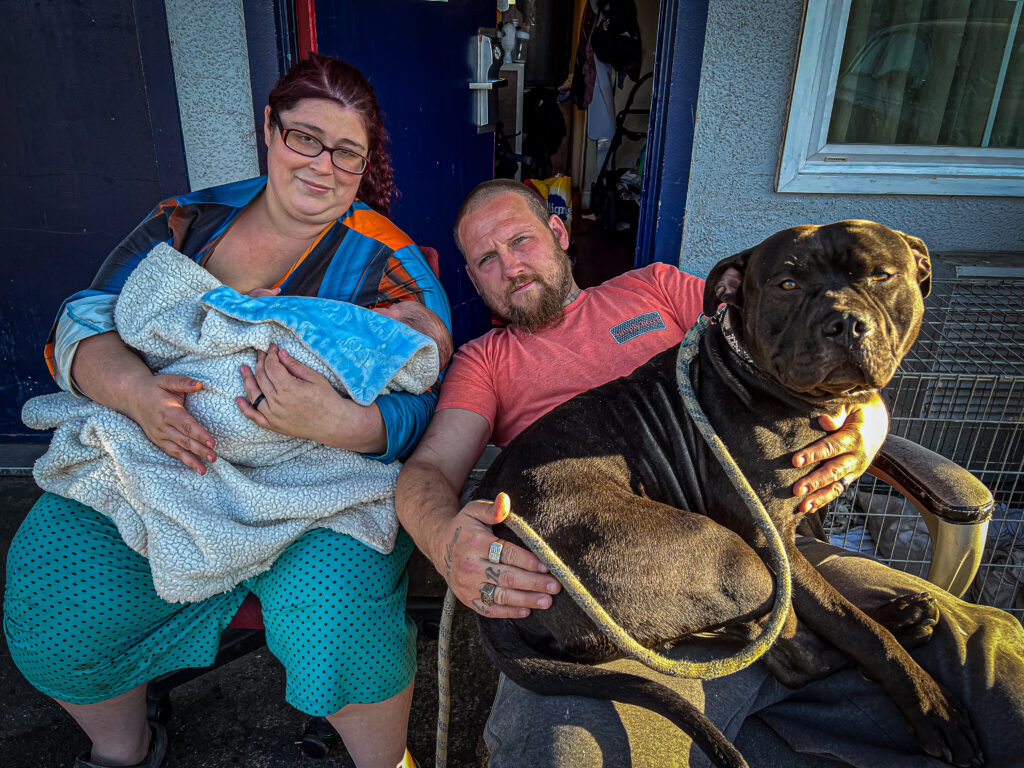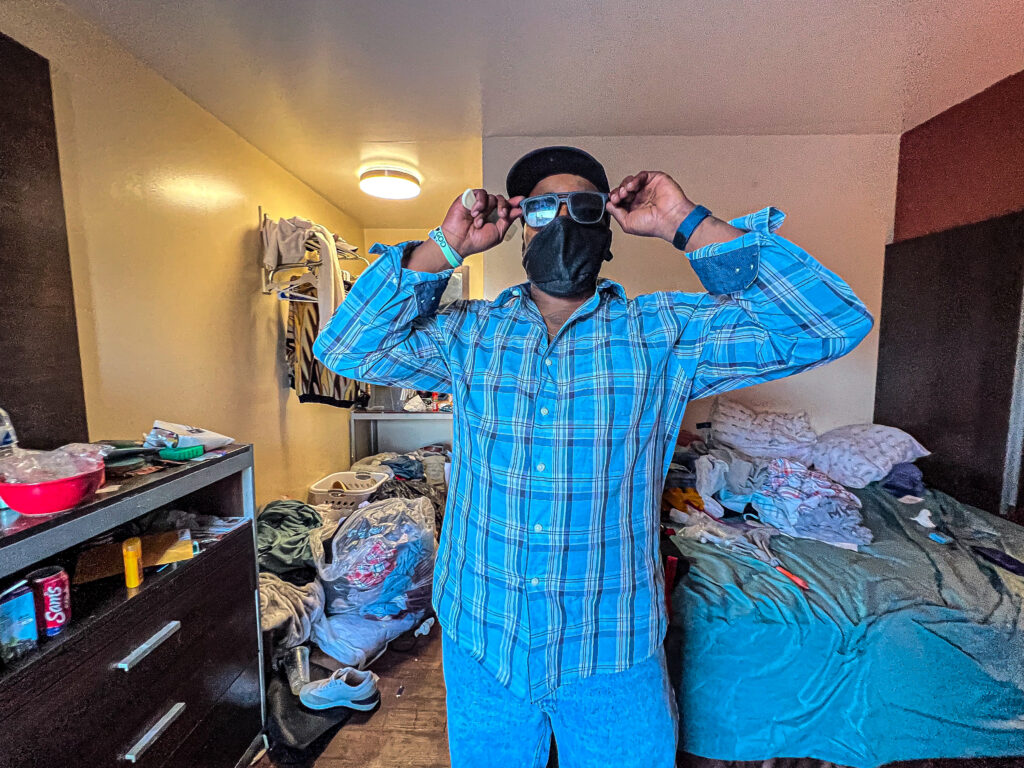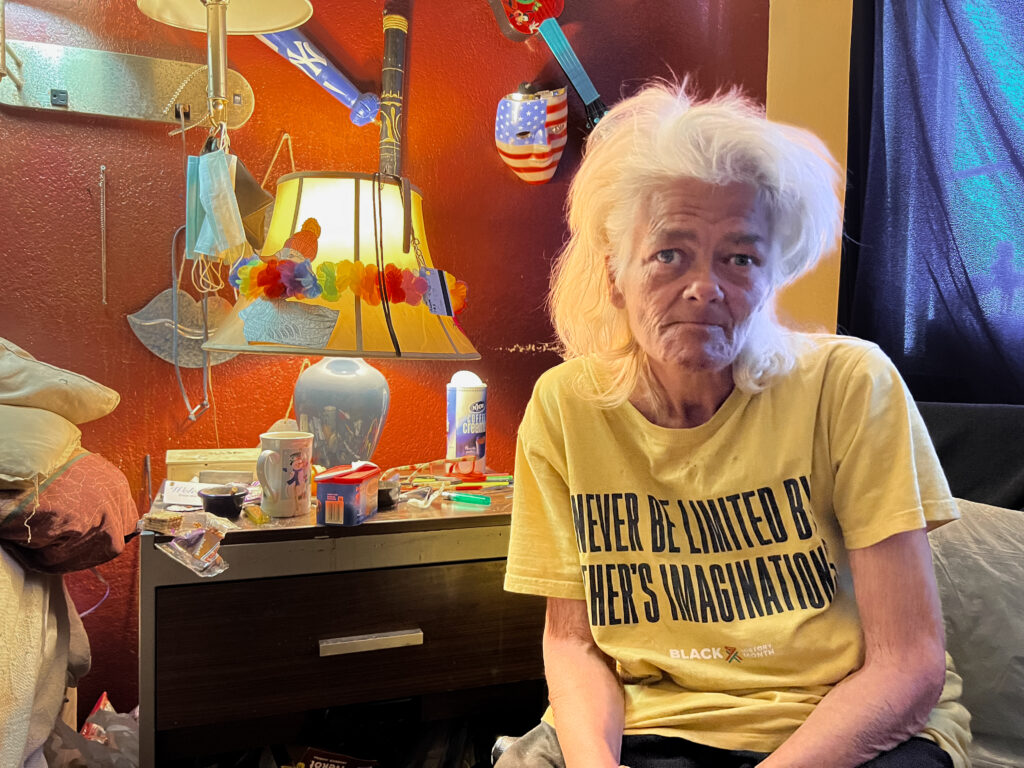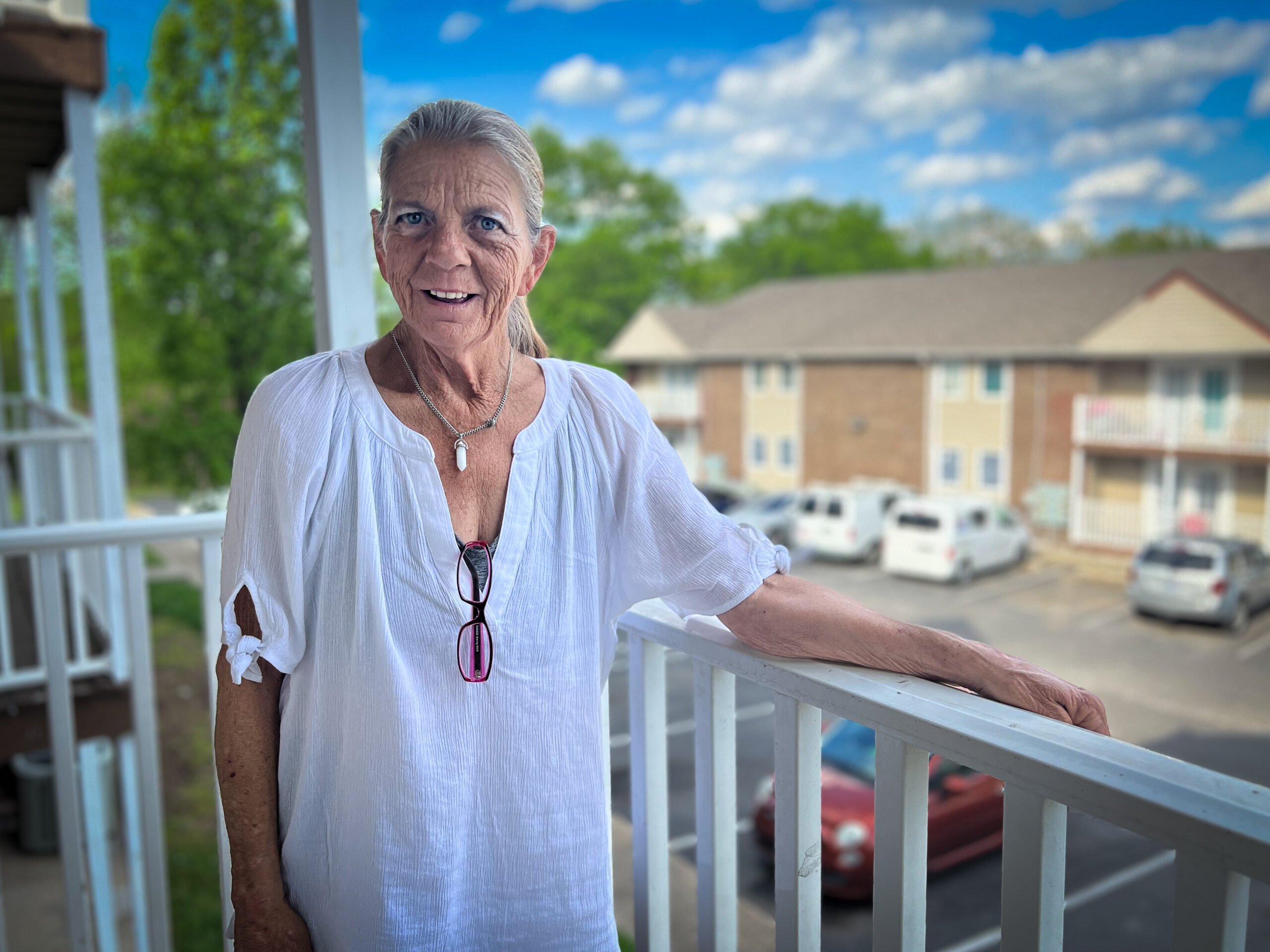
Tammy’s been struggling to land. Her husband died in 2008 and she eventually had to give up the home they owned. For a time, she slept in a car. She even lived in a small campsite near a Hardee’s on Harding Place over what would become seven years of homelessness.
Now? She’s finally gotten her apartment.
“I’m so happy! I’m just beaming,” she says, gesturing toward her new view. “I think I could jump off this little balcony and then be all right. I didn’t think I’d ever get out from over there.”
By “over there” she means the 124-room motel in South Nashville that she called home for 15 months. The location is one of the best things Nashville has going for it in terms of temporary, “gap,” housing for people seeking a permanent place. It’s pretty central and close to a bus line. Most of all, it’s indoors.
Still, there are tensions around conditions and safety at the motel, which has become a key part of Nashville’s housing strategy. And many residents have found themselves staying longer than anticipated.
Former Brookmeade Park encampment resident Quontize Gordon says it’s a hard place to be.
“I’m a five, six times convicted felon. Drug charges. I come from cultural drug selling in my family,” he says, “literally thought that it was the right thing to do. All I’m missing was the white coat and the tag.”

Quontize “Q” Gordon, who previously lived in the Brookmeade Park encampment, says staying clean is a challenge while he waits for an apartment.
“When you’re a drug user and you’re surrounded in an environment like this, it is hard for you to stay clean,” he says. “Like, it’s just remotely impossible. I’ll have my Bible out, I’ll be in Bible study, people will be popping up and they want dope.”
Gordon grew up with another motel resident but he had to tell him to stop visiting because of the man’s meth use. “I had to get security to get him out my room … he was just, like, wired,” he says.
“I went to him the next day, tried to make amends to him. I’m glad I did, dude, ’cause he died like that same night … overdosed.”
‘All learning together’
Motel owner Shabana Ali had noticed people experiencing homelessness in the area years ago and she says she felt for them.
In 2019, when someone from the Mayor’s office approached her about securing just a few of her rooms to use as temporary housing, she was game. “God is telling me, yeah, if you have the resources, why not, you know, help and support the community?
“If I can make my bills and if I can make my money and help thousands of people — at least hundreds — why not?”
Then the pandemic came, so the Salvation Army started moving people from campsites to the motel to reduce COVID risks. More recently, Metro has tapped into $50 million in pandemic federal relief funding to contract with the Salvation Army to retain all the rooms. So Ali turned off booking for the general public. And that’s how her motel became this other thing.
Ali’s new guests come with challenges she didn’t expect.
“We had a lot of problems because everything happened so fast and we were all learning together,” she says.
Like overdose deaths. She says there have been at least 20 since the change, a figure supported by incident data from city police. She’s even found some people on her own.
“Thank God that I do welfare checks, right? It’s me and my staff who find people in a hard situation.”
Even though Ali is a motel owner, and not a social service provider, she decided to start doing weekly visits. Her motel has five main buildings and she and her staff visit one each weekday — knocking on each door.
“If a person needs help, how do you know? … We found one person fall off the bed — not be able to get up on her own. We found so many other situations.”
“That’s another reason I love doing it,” she says, “if I’m accommodating somebody here, I’m not letting them die and suffer. If I want to do it, I’ll do it right. That’s what my goal was.”
These visits double as an opportunity to check the physical state of each room. Maintenance of the property is a major issue.
“They flush Clorox wipes and shoes,” Ali says, “keys and washcloths and T-shirts and everything.”
‘Never gonna quit’
One resident, Rhonda Mejillia, says she’s told motel management numerous times about repair needs in the past year-and-a-half. Now, she’s frustrated.
 Tasha A.F. Lemley
Tasha A.F. Lemley Rhonda Mejillia says maintenance concerns are one of the hardest parts of her time in gap housing.
Among other issues, her refrigerator is hot, and her toilet seat is broken — she’s taped it up. There’s also a crack in the bathroom ceiling, “and the lady’s bathroom upstairs was leaking down on my head when you sit on the toilet,” she says. “I done told ’em about it like 20 times and they still ain’t fixed it … they just fix it to make it look like you got a room.”
Ali talks about vandalism and theft. Residents have sold the motel microwaves and refrigerators. There’s broken mirrors and televisions, furniture, walls, and plumbing — sometimes intentional, she says. She says residents need very basic re-education on how to live inside and take care of a place.
For some, it doesn’t come naturally after living outside for a long time.
“All the rooms are burning utilities 24/7,” she says, “just imagine the utility bills here.”
Maintenance costs come out of Ali’s pocket. She gets $988 per occupied room each month. She says some currently unoccupied rooms need $10,000 in work.
“Just imagine if this homeless project is over,” she says, “it’s gonna cost me at least $2 million or $3 million to fix this property back.”
So, no one claims the arrangement is perfect. But Ali wants to stick with it. She still cares and says only a small percentage of her tenants are causing issues. She refers to each of the more than 100 residents by name and room number and she says she can even picture each of their spaces.
“I did this because I wanted to do it. Nobody forced me to do it,” she says. “I’m never gonna quit doing this.”
‘Survival mode’
One thing nearly everyone seems to agree on is improvements tied to newly-funded 24-hour security.
Before that, “it was wild there for a while,” Mejillia says “Prostitutes coming up in here, sleeping on the steps, drug dealers, people out in the parking lot got shot and killed — and I even got bullet holes in my door.”
The number of calls to police say a lot. The motel went from a call every few days — when it was just a motel — to more than 1,000 in 2021. There were more than 1,000 again in 2022.
“It was stressful. It was dangerous. It was not a good time,” says Chelsea Krause, the retention team lead for the Salvation Army. But lately she sees, “happiness, smiles.” She says, “clients seem less stressed out. They’re able to actually come out of survival mode.”
Some of Krause’s team is stationed around the clock in one of the motel rooms. Before security was hired late last year, she says, “you weren’t able to actually have a true conversation with your clients while you were there because you had to be so aware of your surroundings.”
Her team works with tenants on everything from food stamps to mental health care to housing and addiction services. At times, they’ve swooped in to administer overdose reversal drugs.
“It’s just so dangerous, and you never know,” Krause says. “We have a client who passed of an overdose from marijuana laced with Fentanyl.”
While navigating all the challenges, the goal is getting clients to a permanent living situation in about three months. But it can take much longer.
Krause says part of the reason is lack of ID, birth certificate, or social security card. She says 80 to 90% of the nearly four dozen people from Brookmeade Park were not document-ready when they came to the motel. This can slow down the permanent housing process by at least three months.
Criminal history can also cause delays, and that’s despite a proactive program that seeks to lower barriers.
“Finding a landlord who is completely willing to take people with pretty substantial backgrounds is still difficult,” Krause says.
That’s the case for David and Kimberlee Lajeniss. Their son Christopher was conceived and carried to full term while they’ve been living at the motel. They’re still waiting for a permanent apartment — now with an infant.
Like other residents, drugs in the area and property maintenance issues challenge them, too. David Lajeniss says motel staff was renovating next door and paint fumes filled up their room. He tells management they need to do something — that it’s not safe for his family to breathe the air.
“You know my son can’t be in the room. My wife can’t … my dog can’t even be in that room,” he says.
In one incident, Lajeniss says he got frustrated and cursed at the staff, leading to security being called. They were able to de-escalate and brought a cage for the their’ dog to sit outside. Until the fumes faded, he says, they stayed in another room.
“It’s not a good place if you’re trying to stay sober,” says Kimberlee Lajeniss. “It’s not a good place to have your kids, which I hate that my son’s here. But it’s a lot better than when we were in a tent.”
The Salvation Army’s contract with the motel goes through October 2024. This fall, the organization will start looking at what happens next and whether this type of approach is a keeper.
Back at Tammy’s new apartment, she reflects on the past few years .
“Your prayers do get answered,” she says, “you just have to keep the faith. Keep going. You’re gonna have bad days. You’re gonna have hard days. You’re gonna think they’re never gonna be answered. But they will. They will be answered … and if he don’t answer, then it wasn’t meant to be. You just move on to the next step. You just take another step on up.”
 Tasha A.F. Lemley
Tasha A.F. Lemley After seven years of living unhoused, Tammy moves into a permanent apartment.

